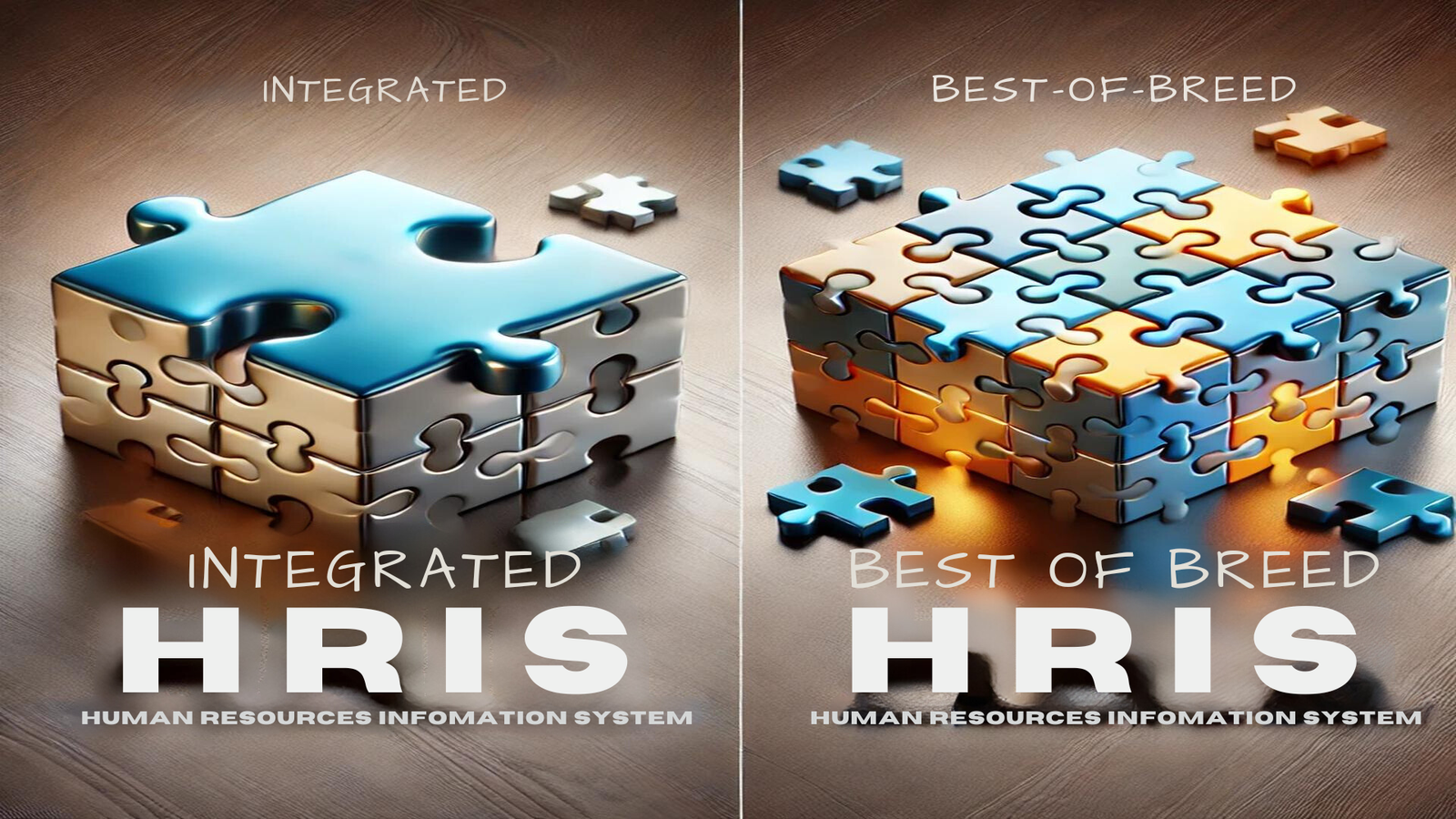
HRIS and Hosting: Integrated or Best of Breed, SAAS or On-Premise?
In the field of human resources management, choosing the right Human Resources Information System (HRIS) is
crucial to meet the specific needs of an organization. Today, two approaches dominate the market: integrated
HRIS and modular HRIS, also known as Best of Breed. Each approach has its own advantages and disadvantages,
and the choice between the two often depends on the organization's size and specific requirements.
Integrated HRIS: The All-in-One Approach
. The illustration features multiple interconnected mo.webp)
An integrated HRIS offers a unified solution covering all HR functionalities in a coherent platform. It
combines multiple modules (payroll, talent management, recruitment, time management, etc.) into a single
unified system.
- Advantages:
- Data consistency: Centralized information reduces errors and facilitates decision-making.
- Smooth user experience: Single interface for easier use.
- Global updates: Simplified updating of the entire system.
- Disadvantages:
- Lack of flexibility: Generalist approach may not meet all specific needs.
- High initial cost: Expensive implementation, especially for small businesses.
- Limited customization: Difficulty in customizing certain functions.
Modular HRIS (Best of Breed): The Tailored Approach
 with different independent modules (payroll, talent management,.webp)
A modular HRIS allows you to choose the best software for each HR function (payroll, talent management,
etc.). These solutions are then integrated to form a tailored HR ecosystem.
- Advantages:
- Specialization of functionalities: Modules are better suited to specific needs.
- Flexibility: Ability to choose and combine solutions according to needs.
- Scalability: Modules can be added or removed as needs evolve.
- Disadvantages:
- Integration complexity: Different modules must be integrated correctly.
- High management cost: Managing several solutions.
- Multiple training: Adapting to different interfaces.
HRIS Hosting: SAAS vs On-Premise

In addition to choosing between an integrated or modular HRIS, system hosting is also a crucial factor.
There are two options: SAAS (Software as a Service) and On-Premise.
On-Premise Solutions: Total Control but Technical Complexity
On-Premise solutions are
hosted on the company's servers and managed by internal teams.
- Advantages:
- Total control: Complete control over data.
- Customization: Highly customizable solutions.
- Data security: Internal hosting of data.
- Disadvantages:
- High cost: Significant infrastructure investment.
- Maintenance complexity: Internal teams must manage updates.
- Limited scalability: Less flexible in case of rapid changes.
SAAS (Software as a Service): The Dominant Option
HRIS solution providers are
increasingly favoring the SAAS model, hosted on external servers (Cloud).
- Advantages:
- Scalability and flexibility: Quick adjustment of capacities as needed.
- Automatic updates: Providers manage updates.
- Remote access: Accessible everywhere, facilitating remote work.
- Reduced initial cost: No infrastructure investment, with a subscription based on the number of users.
- Disadvantages:
- Dependency on the provider: The company depends on the provider for maintenance.
- Data security: Less control over sensitive data.
- Limited customization: Less flexibility compared to an On-Premise solution.
. The image is divided into three sections_ on the left.webp)
The Different Types of SAAS:
- Public SAAS: The infrastructure is shared between several organizations, offering an
affordable and scalable solution.
- Private SAAS: An infrastructure dedicated to a single organization, offering more
control and customization while retaining the advantages of the Cloud.
- Hybrid SAAS: A combination of both, allowing a company to use certain features in the
public Cloud while keeping other more sensitive parts in private Cloud or On-Premise.
Disadvantages of SAAS:
- Dependency on the provider: The company depends on the provider for maintenance,
updates, and service continuity.
- Data security: Although SAAS providers invest heavily in security, some companies
prefer to have direct control over their sensitive data.
- Limited customization: SAAS solutions may offer less flexibility in terms of
customization, especially compared to an On-Premise solution.
Conclusion:
The choice between an integrated or modular HRIS (best of breed), as well as the decision to host the
system in SAAS or On-Premise, depends on the priorities and specific needs of each company. While the
integrated HRIS offers simplicity and coherence, the modular HRIS stands out for its flexibility and
specialization. Similarly, SAAS hosting, increasingly favored by companies, offers greater scalability and
simplified management, while On-Premise retains its advantages in terms of control and customization.



. The illustration features multiple interconnected mo.webp)
 with different independent modules (payroll, talent management,.webp)

. The image is divided into three sections_ on the left.webp)